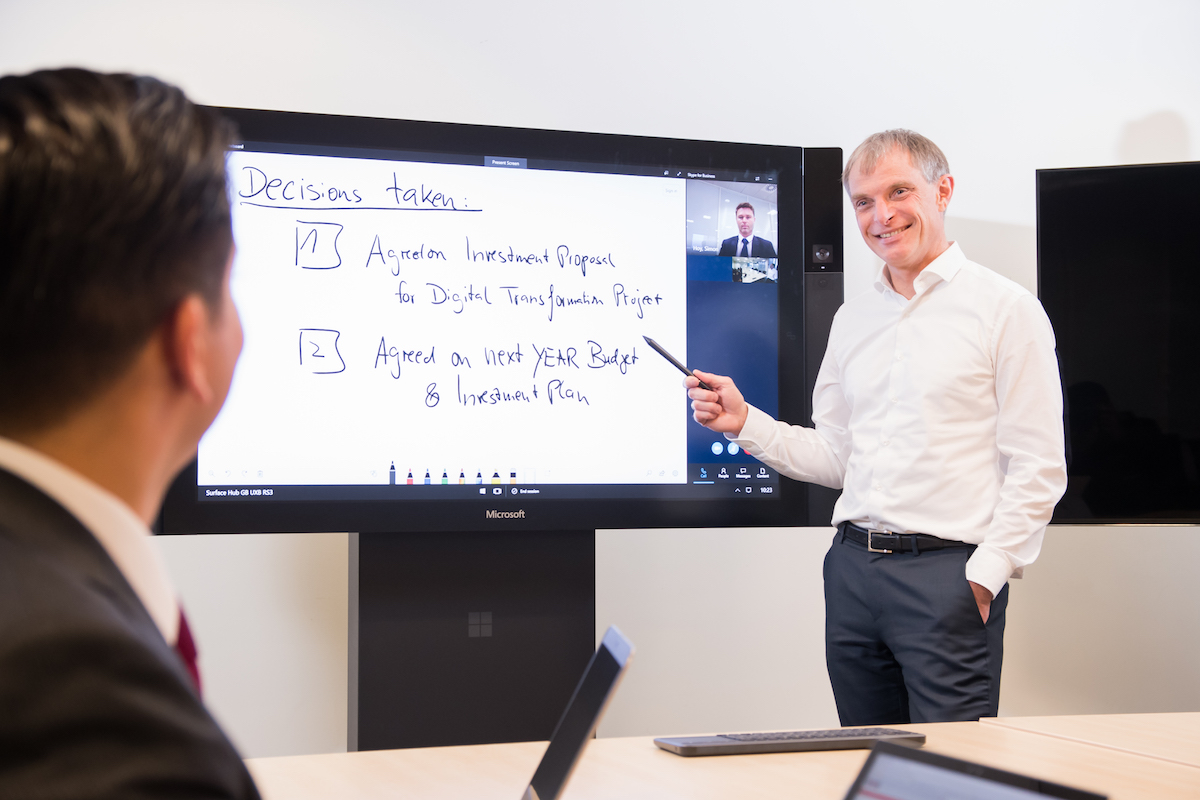On the surface, Insight Enterprises is a company offering both software and hardware as well as a range of cloud-based services to clients across government and industry.
Dig a little deeper, however, and it becomes clear that something far more ambitious and forward-thinking is going on.
The company is aiming to equip organisations with all the tools they need to take part in an unprecedented digital transformation, offering solutions in fields such as network security, data virtualisation, data protection and office productivity.
Wolfgang Ebermann, president of Insight’s EMEA arm, came into his current role after more than two decades at Microsoft, where he held a series of executive positions, including vice-president and COO of Central Eastern Europe. At the technology giant, he had responsibility for more than 2,000 employees and worked across major sales, marketing and service portfolios. He also previously worked at Hewlett-Packard, in marketing and strategic account management.
This experience saw him become an enthusiastic advocate for the idea that companies should not only embrace digitisation, but place it at the very centre of their operations. The effects of this digital transformation are projected to be profound and wide-reaching, ushering in a fundamental shift in how businesses make profits.
Jan van Vonno, Lead Digital Analyst for International Data Corporation (IDC) Europe, predicts that by 2020 more than 40% of the Top 500 European companies will generate most of their business from digitally enhanced products, services and business processes. Jan confirms there’s a clear trend that the executive profile of next-generation CEOs is changing.

IDC even predicts that by 2020, one-third of new CEOs and COOs will have spent at least five years in a tech leadership role. Adidas CEO Kasper Rørsted is an example of this new breed of leader, bringing with him a wealth of digital experience and a focus on appealing to younger demographics through digital engagement.
Asked about how CEOs can drive top-down digital transformation, Wolfgang says that strategic leadership is vital. “First, the CEO has to make digital transformation a key strategic priority of the company. Second, that CEO needs to decide who is the owner responsible for that transformation.”
Wolfgang points out that digital transformation is already happening at great pace and cites the rapid take-up of smartphones as a key example of this. Morgan Stanley has reported there are now some 2.8 billion smartphones in circulation and 1.5 billion have been shipped in the past year alone. For many, this technology is a ubiquitous part of daily life.
Digital transformation on the rise
Experts at IDC are projecting a dramatic growth in digital transformation initiatives. They expect the percentage of companies creating such initiatives to more than double
by 2020, increasing from 22% currently to almost 50%.
Similarly, IDC predicts that 67% of the CEOs of Global 2000 companies will have digital transformation as a central part of their corporate strategy by 2018.
“The smartphone is becoming the digital assistant for private and business use. Based on that, companies have to think about whether the smartphone is having an impact on their current product and services portfolio.
Do they need to adapt their product and services offerings to be truly digitally enabled? If their products and services don’t adapt and take advantage of that digital assistant, they might lose out on the opportunity for future growth.
“If you really want to take advantage of future success using IT as an innovator for excellence, then you have to think about how you can alternate your key business processes even more to take advantage of IT and to digitise your processes. Most important, is to think about how you can modernise the way you run, not just your IT, but also your key business processes.”
Digitisation also promises to change the face of the workforce itself, Wolfgang says. Embracing this change means facilitating new ways of working and ensuring that IT innovation as well as mobile devices and technology are incorporated into the workplace.
“Many businesses know that their workforce is the most important way to drive productivity, but it is also one of the big cost factors in many organisations,” Wolfgang explains. He adds that Europe has particular challenges around increasing workforce productivity and that a digital transformation will help meet these challenges as well as accommodate more flexible ways of working, including remotely and collaboratively.
Wolfgang also predicts that digitisation will completely disrupt current models of client engagement and retention. Companies must embrace digitisation to engage with clients and to ensure their marketing and sales strategies are aligned with how clients receive information.
“Digitisation allows you to show the client that you’re interested in engaging with them in new ways,” Wolfgang explains. “It allows you to drive new client acquisitions, but also to drive client retention and grow sales. This requires the marketing world to be well-integrated with your sales engagement.

Digitisation allows you to show the client that you’re interested in engaging with them in new ways.
“With this approach, you will build true client success teams as opposed to the partners who work in isolation and based on old technology. First, you need to advance your incentives to make them digital-assistant enabled.
Second, you need to increase the digitisation of your processes and organisation. Third, you need to modernise your workplace to become more productive. Fourth, you will need to digitise your marketing and sales force in enabling client engagement, going forward.”
Wolfgang says that all businesses can benefit from a strategic shift to digitisation, even old technology industries and those that have been traditionally hesitant to accept digitisation. “Those that are slow and reluctant need to accept that the smartphone is becoming the personal assistant in both private and business life,” he explains. “The research on this is very clear. It cannot be neglected. Companies that neglect digitisation will miss future growth opportunities.”
Wolfgang nominates Amazon, the world’s largest online retailer by sales and market capitalisation, as a model of how companies should adapt their products and services to capitalise on the ubiquity of the digital assistant that is the mobile phone. “In the sphere of retail services, they have taken the business of purely on-premise stores and transformed that business in a significant way,” he says.
“The same is true when you look at how Netflix is changing the traditional entertainment industry and the way in which we consume media. Businesses need to assess the impact of the personal assistant in both business and private life.
“Operational efficiency has been altered very quickly by digitisation. In parts of Europe, because of our high cost structure, if you want to stay competitive in a global world, you have to do your assessment in terms of driving operational effectiveness. If you don’t, you run the risk of not staying competitive.”
The changing face of IT
While IT is an omnipresent part of contemporary commerce, Wolfgang says it will continue to evolve rapidly. Many CFOs have noted that up to 80%of spending on IT is currently devoted to maintaining existing infrastructure. However, Wolfgang says that the function of IT will change to the point that it becomes a driver of growth and the key to optimising productivity.
Cloud computing is a particular focus for Insight; it has sold more than seven million client cloud seats internationally. This technology is foundational to digital transformation, and Insight believes it will bolster productivity and innovation, so businesses no longer have to be tied to a single location.

In this way, it can allow companies to increasingly tap into the global workforce and share information and resources more quickly and easily. It has already been identified as a market segment experiencing brisk growth, with current industry analyst forecasts suggesting the global market for cloud services will have grown by 18% in 2017. US research and advisory firm Gartner expects cloud computing to become a US$240 billion industry in the coming year.
Cloud technology also has the capacity to facilitate new modes of customer engagement and employee empowerment. A recent survey by MIT Technology Review found that cloud technology can facilitate common reporting tools and information sharing, which will help integrate previously disparate departments such as human resources, information technology and finance.
The technology can even be the foundation of new products and services as well as recalibrated and more efficient business models. Cloud technology also offers more versatility than many realise, Wolfgang says, and can be an invaluable enabler of flexibility and corporate agility.
“Companies need to think about how they can refuse to run their IT infrastructure with a lower cost base, and moving from a topic-oriented, pure-owned, data centre-developed strategy to a smart data centre in the cloud.”
The latter, he explains, allows a business to easily upscale or downscale capacity as needed and without requiring any pre-investment. Intelligence solutions are also much more straightforward and cost-effective with cloud computing as they avoid the necessity for a company to make its own hardware.
“Over the past two decades, IT has been seen as a must-have in business,” Wolfgang notes. “When you look at the key vendors, whether it is on the software or hardware side, they sold technology at its best. They sold technology products and, to understand that language, you had to be able to translate that into business language.
“That was a successful journey; however, if the IT industry is not evolving towards helping businesses to drive the business outcome, then it will not be able to make an impact despite the fact that it’s innovating in an agile way. The innovations might not get adopted because people might just not understand the benefits of IT, and it won’t be accepted as a strategic effort for helping businesses stay on course with regards to their future success.
“The IT industry has to acknowledge that it needs to go from a technology style that was successful in the past, to a business style for the future. That transformation has to happen. IT companies that are able to transform themselves to become IT Business Advisories, are the ones that can help others understand the importance and strategic capability of technology going forward. I think that is the responsibility of the industry. You see many IT companies accepting that and transforming themselves. We are also on that journey right now.
As Microsoft CEO Satya Nadella has observed, companies electing to opt out of the digital revolution are a thing of the past; every business is now a digital business. Insight firmly believes that every organisation, regardless of its size or sector, can use digital technology to lower costs, drive innovation and optimise efficiency.
Leveraging the possibilities of digitisation requires leadership and organisational buy-in, however, and this is an area in which many businesses could improve. Market research firm Forrester has estimated that only 27% of contemporary businesses have a coherent strategy that sets out how they will create customer value as a digital business.
Journey to Insight
During his more than two decades at Microsoft, Wolfgang became familiar with Insight, which ranks as Microsoft’s biggest partner, worldwide. He says the deep synergies between the two companies made for an easier transition into his current role.
“When I had the chance to talk to the CEO and the board of Insight, it became evident to me very quickly that the culture of Insight, as represented by the CEO and the board, was very much aligned with my personal value system. For me, working at a company where my value system aligned with the company value system and seeing a real fit, that was the foundation for making the change.”
It became evident to me very quickly that the culture of Insight was very much aligned with my personal value system.
The opportunity to work for a Fortune 500 company with a global footprint was also appealing to Wolfgang, who started his career with Hewlett Packard, another IT company with a global focus. “I always enjoyed working in international companies and in international roles. So, I saw again a great match and the chance to join a company
that was launching a Fortune 500 company on a global scale.
“The trigger point was that I was engaging the CEO and the board, they were interested and open-minded about transforming their successful business to the next level. I was sharing my interest in how to transform the organisation. Being a core member in helping a Fortune 500, helping them evolve really appealed to me. Having that ability to partner with the CEO and the board in an engaging way, that was basically the trigger point to make that decision to join Insight.”
Wolfgang’s time at Microsoft, the world’s largest software vendor, and hardware vendor Hewlett Packard, gave him valuable exposure to the vendor side of the IT business. “When you work vendor side, you can’t really see the opportunity and benefit of having your own IT with your own product development team,” he reflects.
“When I joined Insight, it became clear to me that, as an IT reseller, you become the agent between the vendors and clients. Your real differential at that moment is that you represent a portfolio of products, rather than just one vendor.
In that case, you are not the only one because there are other IT resellers on a global scale who are technically the same. With that, differentiation becomes more sophisticated or you end up with a very price-aggressive play. For the cost–benefit, you demonstrate to the client that you have a unique advantage. That’s different compared with the vendor side of the world.”
The future of EMEA
Insight’s EMEA group covers 12 nations and Wolfgang identifies there are particular challenges across the region. While different countries covered by the group have divergent cultures, he sees a lack of organisational dexterity in responding to and driving change as a common problem. “Although they are very fine countries, as a general rule, they have rarely seen change as the new normal,” he explains.

“The agility of other continents is ahead of what I am experiencing right now in Europe. You have cloud adoption happening faster in India than Europe. UK, the North market, Netherlands, they are all fast-adopting. Countries like Germany, France, Austria, Switzerland are all slower in driving agility around adaptation.”
An outlier to this trend is the swift adaptation to smartphones which, Wolfgang says, has happened more rapidly in Europe than the US. It gives him hope that the European countries are open to digital transformation of their businesses, as long as there is a commitment from the highest levels of management to facilitate this shift.
“Europe as a union needs to stay aligned; however, there are challenges that we need
to address quickly to ensure that we stay united, if we want to win against the other continents and other global players in the market. Recent circumstances in the past
two or three years have raised some questions around the benefits of the European Union.
We will need to solve those questions and together find the best way to stay competitive and relevant on a global scale.”
Leadership philosophy
Wolfgang’s substantial experience led him to develop a leadership philosophy that is built on people, clarity of strategy and operational excellence. “If you focus on people’s strengths and empower them with smart goals they will excel. Building a successful team includes recruiting strong talent with a diverse set of skills and strengths; utilising these will ensure business goals and objectives are achieved,” says Wolfgang.
“Business success heavily relies on having a focused and clear strategy in place. You need to have a ‘North star’ plan to keep you and your team focused and committed. In today’s agile business world you must ensure your plan includes operational excellence at all stages of execution, ensuring your strategy can adapt to changing business and customer needs.” “You can’t have a good strategy without a defined operation rhythm,” he notes.
You need to have the right attitude. Attitude means you are hungry for continuous development. You have to self-evolve and not stand still.
“A cohesive leadership team that leads by example will deliver true operational excellence with the foundations being built on trust, a strong cultural value system, ethics and integrity.
“At Insight, we foster constructive dialogue, respectfully challenging each other when we need to, reaching the right business decision with full commitment from the team. Ultimately it’s trust, confidence in each other’s capabilities, commitment, accountability and the hunger to drive results that makes a winning leadership team.”
Exponential growth of the digital economy
The World Economic Forum has predicted that the digital economy will be worth more than US$100 trillion by the year 2025. The Forum has also stated that businesses, NGOs and public officials will need to coordinate to fully realise the ‘combinatorial’ benefits of new digital technologies, including artificial intelligence, analytics and mobile and cloud technology.
A study of more than 400 large companies undertaken by the MIT Sloan School of Management found significant benefits from companies that embrace digital transformation. Companies that have bought into this technology are, on average, 26% more profitable than those who have not embraced the technology, the study found.



